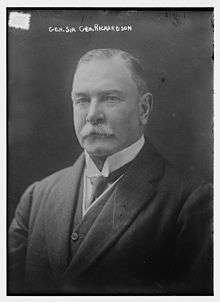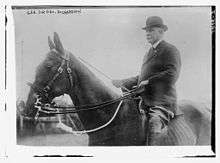George Richardson (Indian Army officer)
| George Richardson | |
|---|---|
 | |
| Born | 20 September 1847 |
| Died | 9 April 1931 (aged 83) |
| Allegiance |
|
| Service/branch |
|
| Rank | Lieutenant-General |
| Commands held |
18th King George's Own Lancers(1892-1898) Agra Brigade (1903) Poona Division (1904-08) |
| Battles/wars | Second Boer War |
| Awards |
Knight Commander of the Order of the Bath Companion of the Order of the Star of India Companion of the Order of the Indian Empire |
Lieutenant General Sir George Lloyd Reilly Richardson, KCB, CSI, CIE (1847–1931) served in the British Indian Army until he retired in 1909. He served across South East Asia, becoming a veteran of the Second Anglo-Afghan War and Boxer Rebellion, and later as commander of the Ulster Volunteer Force in Ireland.[1]
Biography

Born in 1847, Richardson was the son of Major General Joseph Fletcher Richardson.[2] He joined the 38th (1st Staffordshire) Regiment of Foot in 1866 and took part in the Hazara expedition in 1868. He transferred to the British Indian Army in 1869 and was attached to the 18th King George's Own Lancers in 1871. He fought in the Second Anglo-Afghan War between 1879 and 1880 and took part in the Waziri expedition in 1881. He joined in the Zhob Valley Field Force in 1890 and served as commanding officer of the 18th King George's Own Lancers between 1892 and 1898. He served with the Flying Column in Kurram Valley between 1897 and 1898 and then took part in the Tirah expedition. In early 1900 he acted Colonel on the Staff at Rawalpindi,[3] and then fought with the Cavalry Brigade in China between 1900 and 1901, where he led the final assault on Peking during the Boxer Rebellion. He became commander of the Hyderabad Contingent in 1902 and of the Agra Brigade in 1903 and then became General Officer Commanding Poona Division in 1904. He retired from the Indian Army in 1909.[2]
He was appointed Colonel of the 18th King George's Own Lancers from 1 January 1906 until 1921, then the 19th King George's Own Lancers from 1921 until his death.[4]
Richardson's military career however did not end with retirement from the Indian army. In 1913 he agreed to command the then newly formed Ulster Volunteer Force, created to fight Irish Home rule, and oversaw the Larne gun-running.[5] Richardson died in 1931.
Honours
- CIE: Companion of the Order of the Indian Empire - 1893
- CSI: Companion of the Order of the Star of India - 24 July 1901 - in recognition of services during the campaign in China (Boxer Rebellion)[6]
- KCB: Knight Commander of the Order of the Bath - 1909 (Companion (CB) 1898)
See also
References
- ↑ Bardon, Jonathan: A History of Ulster, page 439. The Black Staff Press, 2005. ISBN 0-85640-764-X
- 1 2 Liddell Hart Centre for Military Archives, King's College London, University of London - Survey of the Papers of Senior UK Defence Personnel, 1900-1975
- ↑ "Naval & Military intelligence". The Times (36057). London. 5 February 1900. p. 11.
- ↑ History of the 19th King George's Own Lancers by General Sir H. Hudson
- ↑ The Project Gutenberg eBook, Ulster's Stand for Union, by Ronald McNeill
- ↑ The London Gazette: (Supplement) no. 27337. p. 4917. 24 July 1901.